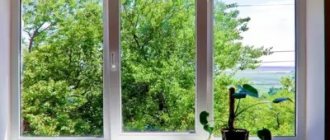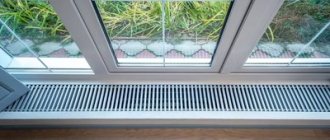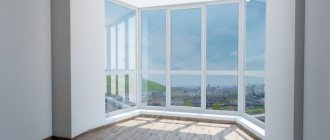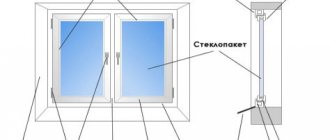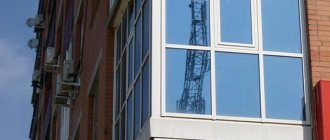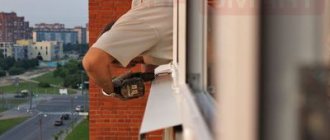Plastic window allows noise to pass through: causes and solutions
Today, plastic windows perform several functions: they protect from adverse weather conditions and street noise, provide access to daylight into the room and visual access to the outside, and allow ventilation without much heat loss.
All this is very important for a comfortable life. If one or more functions cease to be performed, then the house becomes uncomfortable. To prevent this from happening, it is important not only to install the plastic window correctly, but also to carry out its maintenance in a timely manner. One of the common window problems that people have to face is that a plastic window allows noise to pass through.
. Several reasons can lead to this result, and we will now discuss all of them.
Why do plastic windows let noise through?
There are different types of plastic windows, and each has its own soundproofing properties. If you have a single-chamber double-glazed window, you should not expect the highest performance from it. It will protect against noise, but within reason. Soundproofing properties are primarily influenced by such factors as the thickness of the glass, their number, the presence of a soundproofing coating, and the size of the window itself. This should be taken into account at the acquisition stage. Additionally, there are several other factors that influence whether a window lets noise in or not.
To begin with, it is worth saying that the normal noise level indoors is 40 dB, outdoors is approximately 70-80 dB. That is, a high-quality window should reduce street noise by almost half. If you feel that the house is noisy, and the source of the noise is outside the window, which is closed, then pay attention to several things.
- First
, take a closer look at the rubber seal. It is this element that determines how tightly the window is closed. If it wears out, the window will let in not only extraneous sounds, but also dust. It’s easy to notice and it’s possible to fix it, so don’t despair. - Secondly
, pay attention to how the window is installed. It transmits noise not only from the sash, but also along the perimeter of the structure itself. - Thirdly
, inspect the fittings. If there is any damage, if not all mechanisms work smoothly, then the window allows noise to pass through, as it may become deformed or skewed.
In general, there are many reasons why a plastic window allows noise to pass through. The first step to solving a problem is identifying it. A good master can help with this issue. He will not only tell you about the source of trouble, but also solve it. If you want to try to do everything yourself, then we’ll talk about possible solutions to the problem.
What kind of noise can't plastic windows save you from?
First of all, it is necessary to take it for granted: it is impossible to achieve absolute sound insulation, and PVC windows have nothing to do with it. The overall sound insulation of a room is influenced by the condition of the walls, roof, foundation and floors, as well as the frequency ranges of the sound itself.
High-frequency noise enters the room through window slits and is dampened by good seals, while low-frequency noise enters the room through glass. It is with low-frequency sounds that double-glazed windows cope well due to the heterogeneity of the glass and the air gaps between them, while plastic windows, as a rule, allow high-frequency noise to pass through. In a room with PVC windows, you can hear a loud alarm or barking dogs, the sound of units operating at high speeds, a piercing squeak or whistle, the roar of a jackhammer - here double-glazed windows are powerless, although they certainly dampen the lion's share of the noise.
High-quality profiles and fittings, double-glazed windows with different glass thicknesses and different air chambers - all this will protect the room from the noise of a busy highway, the sounds of trams and trains, loud conversations under the windows and the slamming of entrance doors. True, to achieve this effect, when ordering glazing for an apartment, you may have to “sacrifice” 20-30 cm of the window sill or overpay for the installation of laminated glass. But the peace and quiet that you will receive in return, not just for one day, but for many years, is worth it!
A plastic window allows noise to pass through - what to do?
It is worth noting that first of all you need to choose the right
. It must be made of quality materials, both inside and outside. If thin glass and low-quality fittings are used, then it is not surprising that a plastic window allows noise to pass through.
In addition, the window must be installed correctly
. If there are gaps between the slopes and the window structure, then it will allow noise to pass through. When installing a plastic window, you should pay attention to the number of supports for the frame. The more there are, the less load will be placed on the structure. Thus, the polyurethane foam used to fill the joints will last much longer, because less pressure will be exerted on it. In addition, before securing the window with foam, you need to seal the frame and slopes with waterproof tape. It will also extend the life of the windows.
If the problem has already appeared, then you need to remove the window and reinstall it, taking into account the above points. In addition, you can additionally treat all joints with sealant.
If the sash is the culprit for the window letting in noise, it means the window is not pressed tightly. This could be due to the seal
. For example, in the summer the window is switched to summer mode so as not to pinch the seal and wear it out unnecessarily. In this case, the noise level will be slightly higher in summer. If you visually see that the seal is worn out, then this problem can also be solved. It should be replaced. You can do this either yourself or invite a specialist who will quickly make the replacement.
What to do if plastic windows let in noise due to the sash, but the reason is not the seal? It's simple, it's all about the fittings
. It is better to entrust its verification to a specialist. He will check whether the window is warped, adjust the hinges, and clean and lubricate all mechanisms.
In conclusion, I would like to note that if a plastic window allows noise to pass through, look for the cause. Knowing the enemy by sight makes it much easier to deal with him.
Soundproofing windows
A person does everything possible to ensure comfort and coziness in his residential building. He carries out a lot of work, and one of these procedures is the isolation of various noises. Soundproofing windows is a mandatory step to achieve the necessary comfort and coziness.
Purpose of window soundproofing
Not only beauty is valued in the house, but also silence. Walls, ceilings, and floors need proper sound insulation, because the main impact and airborne noise comes through these elements. Even if you isolate the noisy sounds of all these components, you still will not ensure complete silence in your room. Because there are windows and much more - they also need noise insulation. They miss all the noise that occurs on the street. The problem becomes especially acute if you live in a big city.
There is an opinion that metal-plastic windows will help resolve this situation. This is true, but the problem will be solved if the installation of metal-plastic structures was carried out correctly, without any errors. What affects sound insulation? Sound insulation depends on the thickness of the window glass and the distance between them. To be more precise: the larger the air cushion located between translucent structures (double-glazed windows), the better the insulation of unpleasant sounds.
Damage to the seal of windows can have a negative impact. This occurs due to damage to the material that is intended for insulation. In windows made of wood, the frames may be destroyed. All this has a negative impact not only on silence, but also on the thermal insulation characteristics of the structure. They must be eliminated quickly.
How to increase sound insulation of plastic windows
Constant noise from the street is a constant problem for residents of megacities. Plastic windows cope well with this problem, but sometimes even they need additional sound insulation.
When is soundproofing of plastic windows necessary?
The windows in some apartments overlook noisy streets, where cars and public transport scurry around for days.
Constant hum and loud sounds are bad for health, the body gets exhausted faster, sleep becomes restless and intermittent.
It is known that sounds equal to 65 decibels are completely dangerous to health, so it is very important to make sound insulation of windows as effective as possible.
In some cases, it is necessary to ensure that street noise is not heard at all in the room. This is most important in kindergartens and schools, because very loud sounds harm a child’s body much more than an adult’s.
Materials used for sound insulation
The main thing in choosing a material for soundproofing windows is its reliability and safety. A sealant made of silicone and sealant is best suited for these purposes.
First of all, it is necessary to remove all the cracks and gaps that have formed over time between the window and the wall. Typically, polyurethane foam is used for this. After the foam has dried, a layer of plaster or putty is applied to get rid of small cracks.
The windows have rubber seals that require periodic replacement. If they become thinner, the window fits worse, which means noise will penetrate more into the apartment. The old gum is removed, after which the remaining glue is thoroughly cleaned from the windows. The new seal is attached only to a clean surface. After gluing the rubber band, you need to let the glue dry, and only then close the window.
You should pay attention to how well the sashes are pressed against the frame, and the frame is pressed against the slopes. If the installation is poor, in places where parts of the glass unit are adjacent to each other, cracks may form that allow noise to pass through. You can get rid of it using sealant and sealant. Read about the types and types of sealants for PVC windows in this article.
Additional sound insulation of plastic windows
The sound insulation of plastic windows directly depends on their type and quality of installation. Thicker glass can provide additional sound insulation.
You can use a wider frame to install the window; this will increase the layer of air or gas that absorbs sounds. Glass of different thicknesses also contributes to higher sound insulation.
Very often they use triplex - this is a combination of several glasses that are glued together using resin. This design is more resistant to damage.
With triplex, the sound insulation of windows increases significantly - from 28 (for a regular plastic window) to 33 (for triplex) decibels, and all because the presence of such glass allows you to delay sound waves of high and medium frequencies.
Thanks to it, even low-frequency vibrations will not penetrate into the apartment, and they are the most difficult to get rid of. In addition, triplex is considered the safest type of glass; if the sheet breaks, the fragments will remain on the film.
As additional measures to absorb noise from the street, you can use filling the chambers of a plastic window with gases. These include xenon, argon and krypton. The different distances between the glasses help to increase the air space, which means sound is absorbed more efficiently.
Window soundproofing methods
Of course, the best option is to replace the old design with a new one, which is of better quality. In order for plastic windows to have a high level of sound insulation, certain nuances must be taken into account. The number of double-glazed windows in this case is not the determining factor; the thickness of the glass and the distance between them are much more important.
Store salespeople can advise you to use glass consisting of two glasses and a transparent elastic material (triplex) gluing them together. But all this will be effective only if the glass thickness is at least nine millimeters. The distance between the glasses should also be sufficient.
Soundproofing characteristics can be increased if you carry out procedures to adjust them. If your windows are made of wood, then you need to make sure that all angles are ninety degrees. If this condition is not met, the glass will not be pressed against the frame, causing gaps to appear.
Gaps can also appear in PVC. In this case, you need to check how tightly the material intended for compaction fits. The easiest way to help you increase sound insulation performance is to use acoustic blinds. What is required of you? You just need to buy them and hang them, nothing complicated.
What factors influence the level of sound insulation of plastic windows?
- Glass thickness
. Installing glass of different thicknesses will add another 5 dB to the overall “piggy bank”. - The size of the air gap between the glasses
. The greater this distance, the better the soundproofing properties of the double-glazed window. It is desirable that the thickness of the air chambers also be different. - Tightness of the vestibule
. PVC windows must contain at least two sealed gaskets between the components. - High-quality, well-adjusted fittings
ensure a tight fit of the window sashes to the frame, so it’s hardly worth saving on them. - The correct installation of windows
is important (or rather, the correct sealing of the slopes inside and outside, the quality of the installation seams). Incorrectly treated areas with foam nullify all the efforts and costs of the most expensive profile and double-glazed windows.
An interesting fact is that furniture, curtains, carpets and other massive interior items improve the overall level of sound insulation by about 5 dB. Therefore, a “cluttered” room has its advantages.
Soundproofing of wooden and plastic windows
The best option is to replace old windows with better ones. This process will help you forget about soundproofing windows for a long period of time. To avoid any problems, it is better to seek help from specialists. Also, saving your money on buying quality elements is not worth it. Moreover, additional repairs to the slopes are required, so you will have to spend money.
As for the adjustment, the whole procedure will take a few minutes of your time. Problems may arise if you have wooden frames because you will need to remove additional glass. But this is much better than buying new items; you will save not only your money, but also time. Acoustic blinds will significantly increase sound insulation properties, but you will not be able to achieve complete sound insulation with this material.
Choosing a soundproofing window
If you want to replace elements, then you need to determine what class of sound insulation the windows need. The sound insulation class depends on the noise. There are several classes of soundproofing windows. The room is located in a place where cars do not drive, then you will need second class windows. Cars sometimes pass near your living space, you need to purchase fourth class windows. And if traffic is a common occurrence in your area, then fifth-class windows are needed.
It must be remembered that absolute silence is also harmful for a person and can cause some discomfort. Because such silence is unnatural for a person. But if you live in a building with many apartments, you will not encounter this problem. Because if noises from the street do not reach you, then you will hear the sounds that will come from the entrance.
Today, modern plastic windows do not have any specific problems with sound insulation. The comparative price between different classes of windows is small. Soundproofing a window is a procedure that requires a certain level of professionalism if replacement is being carried out. There is no need to do this work yourself. After comparing double glazed windows, you need to make the right choice.
There is a table of factors that affect sound insulation properties. Soundproofing work can be done with your own hands using adjustments. Depending on what material your windows are made from, you need to adhere to a certain algorithm of actions.
If you are working with wooden frames, do not forget that when setting the angles they should be ninety degrees. You can check the quality of sound insulation by closing the window. If you feel a certain resistance when closing, this indicates that the noise insulation has been done well. Stay alert while working.
Why do low-quality windows let noise in?
The permissible noise level for modern houses during the day is 40 dB, and at night - 30 dB. Transport moving at high speed, a construction site near a house or nearby industrial enterprises create noise up to 80 dB.
The task of high-quality plastic windows is to save the house from noise and reduce its level by about 40 dB. At the same time, a standard single-chamber double-glazed plastic window provides noise insulation of only 29 dB, and a double-glazed one – 31 dB.
Why are these figures so low?
Thin glass
The thickness of the glass and the space between the glasses play an important role in sound insulation. To improve sound insulation, I recommend installing glass of different thicknesses. If you live in a not very noisy area, then two glasses of 6 and 4 mm will be enough.
You can also increase the number of glasses to three. The main thing is that in a three-chamber double-glazed window, not only the thickness of the glass varies, but also the air gaps between them.
Let's turn to physics. A decibel is a logarithmic value. That is, a difference of 3 dB means that the value is twice as large as the standard, by 6 dB - four times, and so on.
Effective in the fight against noise, for example, will be the ratio 6-10-4-16-4, where the thickness of the glass is 6, 4 and 4 mm, and the width of the gaps is 10 and 16 mm. When using glass of different widths, the window noise insulation will increase to 34 dB.
Poor quality installation
The properties of even the most reliable windows with an ideally selected ratio of glass thickness and gaps will come to naught if the installation is carried out incorrectly.
Experts advise not to let this process take its course and control the installation of the product. Pay attention to:
- the rigidity of the connection between the box and the wall;
- the use of vapor barrier tape - it will prevent the formation of condensation and prevent the destruction of the polyurethane foam after hardening;
- use of waterproof tape - it is attached to the outside and protects the window from rain.
It is undoubtedly important to seal the installation seams with high quality, because even a slight deviation will lead to a decrease in sound insulation. Proper sealing of slopes inside and outside and compliance with the size of the installation gap play a role.
Bad fittings
The tightness of the fit of the sashes to the frame depends on the quality of the fittings. The denser, the higher the sound insulation of the window.
In the material about sound insulation, I already said that you can check the pressure density using a piece of paper. Just slide it between the frame and the sash. If the leaf passes freely, it’s time to adjust the window, because the cracks affect sound insulation much more than the formula of the double-glazed window.
Let's talk about noise
In the modern world, there are sanitary noise standards adopted for residential premises. During the day, the permissible level should not exceed 40 dB, at night - 30 dB. Non-stop moving transport, construction sites near the house and industrial enterprises - all this creates noise up to 80 dB. Therefore, the main “task” of plastic windows is not just to save from noise, but to reduce its level by about 40-45 dB. How well do modern PVC windows cope with this?
On average, plastic windows with conventional double-glazed windows provide noise insulation within the range of 26-31 dB. If glass units of different thicknesses or at different distances are installed in double-glazed windows, this value increases to 32-33 dB. But a window with a wider profile and a distance between the panes of 15-20 cm can provide sound insulation of about 35 dB.
Sound insulation - choose truly quiet windows.
In the harsh conditions of the Russian climate, the first thing that window buyers pay attention to is the thermal insulation qualities. But later it turns out that the windows let the noise through. Construction in the neighborhood, engines of cars passing by the house, industrial enterprises, the melody of a lawn mower, the roar of a garbage disposal - all these satellites of the urban atmosphere penetrate inside the apartment.
But even in a relatively quiet private sector, it is unpleasant to wake up in the middle of the night from barking dogs or screams from neighbors.
If all of the above is painfully familiar, then you need windows with good sound insulation.
Looking for “quiet” windows
Sound insulation is the ability of materials to reflect sound. Measured in decibels. The opposite concept is noise absorption. Characteristic of soft and springy materials that are heterogeneous in structure. Together, the sound insulation index and noise absorption coefficient determine how “quiet” your windows will be.
Calculate the exact cost of quiet windows in.
(Only for residents of Moscow and the Moscow region), send a request to calculate the cost:
What does the sound insulation of a double-glazed window depend on:
• multi-chamber principle of PVC profile structure;
• quality of the sound-absorbing seal;
• its clamping using modern, for example, German fittings;
• properties of the glass unit itself (number of glasses, their thickness and distance between them);
• professional installation of the product (after all, not only noise, but also wind can penetrate through the installation seam, despite the fact that you bought windows with increased sound insulation).
Noise insulation index
When purchasing, pay attention to the noise insulation index. The higher it is, the better. For a conventional two-chamber double-glazed window with all glasses 4 mm thick, it is only 33-37 dB. This shortcoming can be corrected by pumping inert argon gas into the chambers, because its density is different from the density of air.
Note: the same, but asymmetrical double-glazed window with an outer glass thickness of 6 mm will more successfully reflect sound waves (38-40 dB). Multilayer triplex or laminated glass dampens sound vibrations (40-42 dB) even more effectively, especially if there are different distances between the glasses. 5-packet systems (43dB) are slightly ahead of them in this regard. Designs with 6 packages have the highest noise insulation coefficient (47 dB).
Conclusion: a 2-chamber double-glazed window with glass of the same thickness is not at all suitable for sound insulation. Therefore, if you are interested in soundproofing plastic windows in a city apartment with a busy highway nearby, the design will have to be changed.
Note! The material used to make Eurowindow profiles (wood, PVC, aluminum) is not important from the point of view of sound insulation.
Is it worth installing triplex glass to improve sound insulation?
Definitely worth it! Especially if you need to reduce the level of low-frequency noise coming, for example, from a busy highway. Double-glazed windows with triplex installed outside - laminated laminated glass - or glass with a thickness of 6-8 mm instead of the standard 4 mm automatically turn into plastic windows with increased sound insulation.
It is believed that the sound insulation of plastic windows can be increased by filling the air chambers with inert gases, such as argon or krypton.
Why is sound insulation of double-glazed windows so important?
The desire to live in silence is by no means a whim. Noise is the cause of constant fatigue, chronic insomnia, irritability, frayed nerves and poor performance. But even with modern plastic windows, noise will penetrate into the house and this is good, because what we call “silence” turns out to be a completely measurable value of 25 dB. If the noise level drops below, a person will feel discomfort from the “ringing silence”.
Daytime noise level is 40dB, Nighttime is 30dB.
Constant noise up to 60 dB can already cause hysteria (for comparison: a loud conversation can reach 70-75 dB, and passing cars - 90). This is why sound insulation of windows is no less important than their other characteristics.
Types of noise
Experts divide noise into high-frequency and low-frequency. The first penetrates through the cracks and is “absorbed” by sound-absorbing seals.
The second one is introduced through the glass and is extinguished by the air gap between them (remember how well massive Stalinist frames protect against noise), the mass of the glass and their heterogeneity. How to choose the quietest windows?
The sound insulation coefficient is affected by: • the thickness of the glass, • their number, • the unequal distance between them, • the material used to make the double-glazed window, • the quality of the seals and fittings, • the design features of the windows, • the nuances of installation (especially frames and finishing of the slopes).
External factors
It is also important where the window faces: onto the roadway, highway, courtyard, road, but in a residential area. 1. If we are talking about the desire to isolate ourselves from the screams from the playground and the conversations of grandmothers on the bench, it is enough to install a five-chamber profile with an outer wall thickness of 2.8 mm + a double-glazed window of 32 mm.
2. To neutralize the signs of life in the roadway of a residential area, more powerful noise-proof windows with a 5-chamber profile system and an external wall thickness of 3 mm + an asymmetrical double-glazed window of 32 mm will be required.
3. A house on an avenue or with access to a never-sleeping highway is a punishment. But a profile system with 6 chambers + 44 mm double-glazed windows will protect residents as much as possible from this scourge. But if someone is looking for the maximum strength of sound reflection, choose a glass unit formula, for example, 48 mm thick with a 3-circuit seal.
Soundproofing windows in an apartment: practical aspects
1) When purchasing windows, look at the noise index indicators in their passport. Choose a product with the maximum index, since in practice the indicated numbers will decrease by 6-7, or even 10 decibels.
2) If you still decide to take a double-glazed window, make sure that the glass in it is of different thicknesses to avoid the effect of resonance. An additional sash with one glass and a double-glazed window (formula “2+1”) is better than a double-glazed window with the same panes.
3) Pay attention to the way the transom is opened. It is known that the more airtight the structure, the less noise it transmits. If the glazing area is large, choose a blind window in the middle with opening sashes on the sides. Remember that sliding panoramic windows create a risk of noise from the street entering the house. Small swinging products are much “quieter”. The presence of a rotating mechanism also does not have the best effect on the owners’ struggle with noise.
4) And once again, pay attention to professional installation with a guarantee, so that in case of any shortcomings, a specialist will tighten the fittings or correct other problems for free. Important! Professional installation eliminates the use of foam. It is completely useless in terms of sound absorption. The real barrier to sound waves is non-drying silicone.
Living surrounded by extraneous sounds is uncomfortable and unhealthy. A sound-insulating double-glazed window will save you and your family from this problem and will create a favorable microclimate for quality sleep, concentrated work and pleasant rest.
We can recommend a Moscow company, . This company will help you choose “quiet” windows.
Considering the good noise-insulating properties of brickwork and studying the actual noise levels in an apartment, it is not difficult to guess that residents of houses located along busy highways suffer from excessive decibels precisely because of poor-quality windows. Even the thinnest plastered brick wall blocks more than 10 dB more noise than a window rated as soundproof. It logically follows: noise outside the window that irritates people requires improving the sound insulation of window blocks.
Content
- Replacing old wooden windows and air flow problems
- Ventilation valves
- The main factors influencing the soundproofing characteristics of windows video video video
- A window block of two frames significantly improves the quality of sound insulation
- How effective is it to fill the chambers of double-glazed windows with gases?
- Please note
Replacing old wooden windows and air flow problems
Those who had to live in a house built in Soviet times know firsthand how poorly wooden windows functioned in them - there was no need to talk about their tightness, moreover, they let in not only street noise, but also cold air, their I had to seal it up for the winter. Replacing them with plastic windows with double-glazed windows made it possible to quickly achieve a significant reduction in noise levels - this was achieved due to tightness.
But in the end, the residents did not experience much joy from the installation - during the construction of old buildings it was planned to receive fresh air through the windows, ventilation ducts were provided only in the kitchen, bathroom and toilet. Installing sealed windows in all rooms led to stuffiness in the room. Feeling the need for fresh air during the night's rest, people, going to bed, opened the window for ventilation. The same noise that windows were installed to combat came into the room along with the fresh air.
Modern construction provides for the presence of forced ventilation in apartments. In such houses, windows with noise protection actually provide quite reliable protection from external noise.
Ventilation valves
Unfortunately, most people are still forced to live in houses built according to designs that meet low sanitary and technical requirements. In such a situation, installing ventilation valves with a high level of noise protection may be a good option. They protect against excess decibels and ensure sufficient freshness of the air in the room. They are installed separately, in specially created holes in external walls, or mounted directly into the frames of window blocks. It is difficult to say that this option is widespread; not all construction companies offer their installation.
The main factors influencing the soundproofing characteristics of windows
Research shows that the main components of high-quality window sound insulation are:
- maximum total thickness of the glass unit
- glass unit tightness
- increasing the distance between glasses in a double glazing unit
- use of glass of different thicknesses
- use of special glass - triplex
- breaking large glasses into fragments using imposts.
When deciding which double-glazed window to choose, pay attention to the above points and the quality of the fittings.
The first single-chamber double-glazed windows that appeared in our country had the formula 4x16x4, where 16 is the distance between the glasses expressed in mm, and 4 is the thickness of the glass itself in mm. Following them, two-chamber double-glazed windows and three-chamber double-glazed windows appeared. They were advertised not only as having higher thermal insulation properties, but also as providing improved sound insulation.
In fact, the noise insulation indicators in packages of any chamber type depend to a large extent on the figure obtained by summing the thickness of each of the glasses with which the double-glazed window is equipped. For example, noise insulation indicators will be the same when using 4x12x4x8x4mm and 6x20x6mm packages.
A significant improvement in sound insulation will be facilitated by the use of glass of the maximum possible thickness, we are talking about 6 and 8 mm glass. To improve performance in the manufacture of two-chamber bags, they resort to shifting the inner glass to the outermost one - this allows, to some extent, to avoid increasing the penetration of noise at resonant frequencies. However, with any design of a double-glazed window, it has its own resonant frequencies that cause a decrease in the quality of sound insulation.
This has virtually no effect on the quality of noise protection in a city apartment - street noise is characterized by a broadband spectrum. But if there are sources of low-frequency noise near the house, such as places where trucks move, construction sites or industrial enterprises, then it is advisable to analyze the characteristics of its sound insulation and the noise composition in the area where it will be used before choosing a double-glazed window.
Recently, in order to improve sound insulation performance, they are increasingly resorting to the use of triplex, which is a laminated glass that can limit the penetration of mid-frequency waves and high-frequency sounds. Replacing each of the monolithic glasses with triplex allows you to increase the sound insulation value by 3 or 4 dB, but the thickness of the material should not be less than 9 mm, and the film layer should be double; a filler layer made of acoustic resin can also be used.
A window block of two frames significantly improves the quality of sound insulation
Significant changes towards improvement are made by a double-glazed window, the glasses in which are located at the maximum distance from each other - it can reach from 40 to 50 mm. But sometimes they resort to equipping windows with classic paired frames, proven in ancient times, where the distance between the glasses reached 57 mm. If thick glass, for example 6 mm, was used, then, with sufficient tightness, the resulting sound insulation index reached 35 dB, which exceeds the same figure for a modern double-glazed window, where the distance between the glasses is 16 mm.
To improve sound insulation, they also use the installation of a window block of two frames: the outer one with one glass of 8 or 20 mm, the inner one with two, 6 or 8 m thick. The thickness of the block in this case is more than 120 mm, the sound insulation index will be quite high, equal to 46 dB.
How effective is it to fill the chambers of double-glazed windows with gases?
Contrary to the promised improvements in the quality of sound insulation from filling the cavities of the glass unit with inert gases, no significant change in performance is observed when using them. The maximum changes that can be obtained are from 1 to 4 dB, which in reality does not always justify the funds spent on these measures. A greater positive effect can be obtained by giving preference to profiles with a large number of chambers and a thick reinforcing profile.
Please pay attention!
Of no small importance for good sound insulation is also the high-quality installation of the window unit and the absence of acoustic cracks in the area of the window opening, which pose a serious threat to noise insulation and are difficult to detect. Such a negative phenomenon can be caused by slopes that are not plastered, but simply sewn with plasterboard and masonry; plastic is not the best option for use for such purposes.
There is no hope that this defect can be corrected by polyurethane foam - its soundproofing properties are very low. With this arrangement of the window opening, noise will penetrate into the apartment along its entire perimeter. The situation will be further worsened by a frame that is too small for a given opening - it is deliberately made this way for safety purposes - so that there are no problems during installation. As a way out of the situation, we can suggest dismantling the plasterboard slopes and plastering the surface with a thick layer of cement mortar, followed by its decorative treatment.
Author: Sergey and Svetlana Khudentsov
10
How to get rid of street noise
Many people know the problem when annoying noise from the street is heard in the house.
In this article we will look at the causes of this unpleasant phenomenon and ways to solve this problem. Simple wooden windows are a rarity these days. A large number of householders install plastic windows in order to protect their home from drafts, rain and other external factors. After all, plastic windows provide very good sound insulation; extraneous noise from the street is not heard. But very often they do not provide good protection.
Getting rid of gaps
When PVC windows are installed, gaps and holes often remain and, naturally, cold and noise from the street enter the room through them. The easiest way out is to change such windows, but this is not very rational and takes a huge toll on the family budget, especially considering that you recently replaced the double-glazed windows. The most economical option is to do the soundproofing of PVC windows yourself.
So, first of all, check if there are gaps and holes - these are the most important sources of sound from the street. This problem is very easily solved using polyurethane foam. It’s better not to save money and buy good, high-quality foam. We seal the seams, filling all gaps with foam. When the foam hardens (about a day), carefully clean off all excess with a knife, and fill the seam with putty both inside and outside.
PVC windows as the best protection against noise
Quiet evenings and calm nights - this is what residents of the metropolis dream of after the daily bustle and city noise. But, having returned home, many of them are again forced to put up with the hum of cars and annoying rumbles, whistles, clanging and other external irritants. In such a situation, there is perhaps the only solution - to install PVC windows as the best protection against noise. But not everything is so simple: not all plastic windows protect against noise as much as residents of big cities would like. What is the secret of PVC windows with enhanced sound insulation properties?
